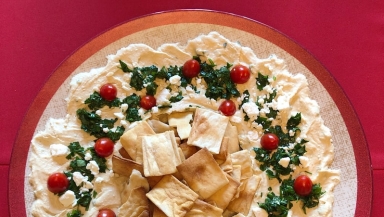
Christmas is notoriously a time of indulgence: there are all of the chocolates, cheese boards, mince pies, nuts, crisps – and that's after you've already eaten your own body weight in Christmas dinner. So it's maybe not surprising that many people end up putting on a bit of weight.
Research suggests that not only do people put on weight more quickly during the festive season but that those pounds can be tricky to shift. Indeed, specific research has been carried out to look at Christmas weight gain interventions.
If you're worried about putting on the pounds this Christmas, understanding how "food variety" affects the way you eat may help you to not get too carried away at the party buffet. This is important because the more variety on offer, the more we tend to eat. Studies have shown that when there is more than one type of food consumed within a meal and across the courses of a meal, people tend to eat more.
This "variety effect" has the potential to be very helpful if you are trying to eat more of a particular food – such as fruits and vegetables but can be unhelpful if you are trying to eat less of a particular food – such as desserts.
'Just one more'
I recently spoke to farmer and television presenter Jimmy Doherty on Channel 4's Food Unwrapped Christmas Special, about food variety and how knowing about the "variety effect" can help you eat fewer post-Christmas dinner chocolates.
On the programme, we asked two groups of volunteers to decorate Christmas trees and gave them chocolates to snack on. We found that, in line with other scientific studies, people will eat more from a bowl containing a variety of flavoured chocolates than a bowl containing only one type of chocolate.
The "variety effect" is thought to be the result of a phenomenon called "sensory specific satiety". This is where our desire to consume a food of a particular flavour, colour and texture, decreases while we are eating it. This is one of the processes that helps us to stop eating and finish our meal. But this doesn't affect how much we appreciate other foods – and our desire to eat other different foods does not reduce.
In this way, switching between foods with different flavours interrupts and delays this decline in desire to eat from kicking in. And after a number of interruptions, the meal or snack time becomes longer and more is eaten overall.
Take the example of the chocolates from the Food Unwrapped Christmas Special, the group of volunteers who ate from the bowl that contained identical chocolates, will have experienced the chocolates as less and less pleasant as they ate them – and they would be less inclined to continue eating. But the volunteers who ate chocolates from the bowl containing a variety of different chocolates, would have experienced each new flavoured chocolate as pleasant and the decline in pleasantness for each flavoured chocolate would be interrupted by the next. Overall, this led to more chocolates being eaten by this group.
Limit your choices
Naturally, food variety isn't just limited to Christmas. Foods with different flavours, textures, smells and colours are tempting all year round. Christmas time simply provides more opportunity to eat a variety of foods, as seasonal items become available in the shops. But knowing about the "variety effect" means you can have more control over what you're putting on your plate.
Take those selection boxes of chocolates, if you have the chance to choose your own, try to choose fewer types of chocolates to avoid eating quite so many. You can also use the "variety effect" to surreptitiously encourage yourself and your guests to eat a wider selection of vegetables with Christmas dinner.![]()
Laura Wilkinson is a lecturer in psychology at Swansea University. This article is republished from The Conversation under a Creative Commons license. Read the original article.













